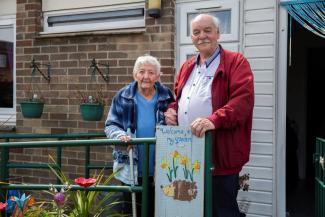A home that is affordable, secure and suitable is essential to our wellbeing and should be a basic human right.
However, for many older people living on a low income, affording their housing costs, feeling free from the threat of eviction and living in a decent standard of home is not the norm.
To improve the lives of older renters in Scotland we must ensure that:
- rents are affordable
- people are protected from unlawful eviction and homelessness
- a decent standard of accommodation is provided
- tenants’ rights are upheld.
What needs to change: Affordability
Affordable housing is a central pillar of any socially just society aspiring to reduce poverty. Currently too many older people – particularly those living in private rented accommodation – are being pushed into poverty because of unaffordable rents.
Almost 50,000 older people in Scotland live in a private rented property, with the proportion of older private renters in poverty increasing in recent years. At the same time rents have been rising. Prices in the Private Rented Sector (PRS) increased by 4.5% in the 12 months to January 2023 – notably the highest annual percentage change since data collection began in 2012.
While the supply of low-cost social housing is critical to improving affordability in the long term, the majority of older renters cannot afford to wait; people living on a low income in later life are already struggling with their rents in the here and now. Some 6 in 10 older people in the PRS say they still worry about rising rents despite the current rent restrictions.
What needs to change: Evictions and homelessness
At Independent Age we believe that everyone who rents in later life should live in a home where their tenancy is secure. They should be safe in the knowledge that, if anything were to put their current housing at risk, their rights would be protected, and, if needed, they would be supported to find an affordable and suitable alternative.
However, many of the older people we have spoken to are understandably anxious about losing their home. This age group is not immune to homelessness and figures show the situation is getting worse. The number of homelessness applications from people aged 65 and over in Scotland saw an annual increase of 23% in 2022/23.
Access to support for older people facing eviction and potential homelessness is vital. Extending in advance the time period that local authorities have a duty to support someone facing homelessness from two to six months would enable older people to access assistance at an earlier stage. It is also essential that older people are informed about this support and other independent advocacy routes.
What needs to change: Standards
The importance of safe, appropriate and comfortable homes for older people cannot be overstated – these elements are fundamental to maintaining health, a sense of community and independence in later life.
However, this is not the experience of many pensioners living on a low income who rent. Some live in homes that are damp and unsafe, and often feel that there is no way to resolve the problems they encounter.
All rented homes in Scotland should already meet the Repairing Standard, which sets out the minimum standards private rented properties must meet. Updated guidance is due to come into force in March 2024, which adds central heating and adequate kitchen facilities. Though many good landlords will already meet these standards, our evidence shows that some older people are living in properties that are damp, cold and neglected and, at times, fear raising concerns at all.
What needs to change: Housing rights
Older people who are tenants – in both private and social rented properties – must be aware of their rights and must be confident that a system is in place to help them pursue justice if their rights are breached.
Our evidence tells us there is still a worryingly low level of awareness of rights in the private sector, particularly among tenants, and this is leaving poor, and often unlawful, practice unchallenged.
Even when people understood their rights, our research found that some low-income tenants were less likely to challenge their landlord for fear of consequences, since they have fewer housing options in the market than people with a higher income.
Key statistics
Almost 4 in 10 (39%) older private renters live in poverty.
Some 28% of older private renters have less than £200 disposable income a month after paying their rent.
Eight in 10 older people support limits on how much landlords can increase rents.
Half of private renters over 65 still worry about eviction despite the current protections.
Some 65% of the houses lived in by older people are in a state of disrepair.
Less than a third of older renters feel fully informed of their housing rights, with 1 in 5 saying they know nothing.
What is Independent Age calling for?
Independent Age recommends the Scottish Government:

Have you been affected?
If you have been affected by any of the issues raised in this report, call our Helpline on 0800 319 6789 to arrange to speak to one of our expert advisers. We also have a range of housing information online, which is completely free and impartial.
If you would like to share your renting story with us, email our campaigns team, who are here to listen sensitively and without judgement. We won’t ever share your story without your permission or ask you to do anything you’re not comfortable with.
Want to know more?
Read our full report to learn more about the challenges faced by older renters in Scotland and what needs to change to ensure everyone in later life has an affordable, secure and quality place to call home.